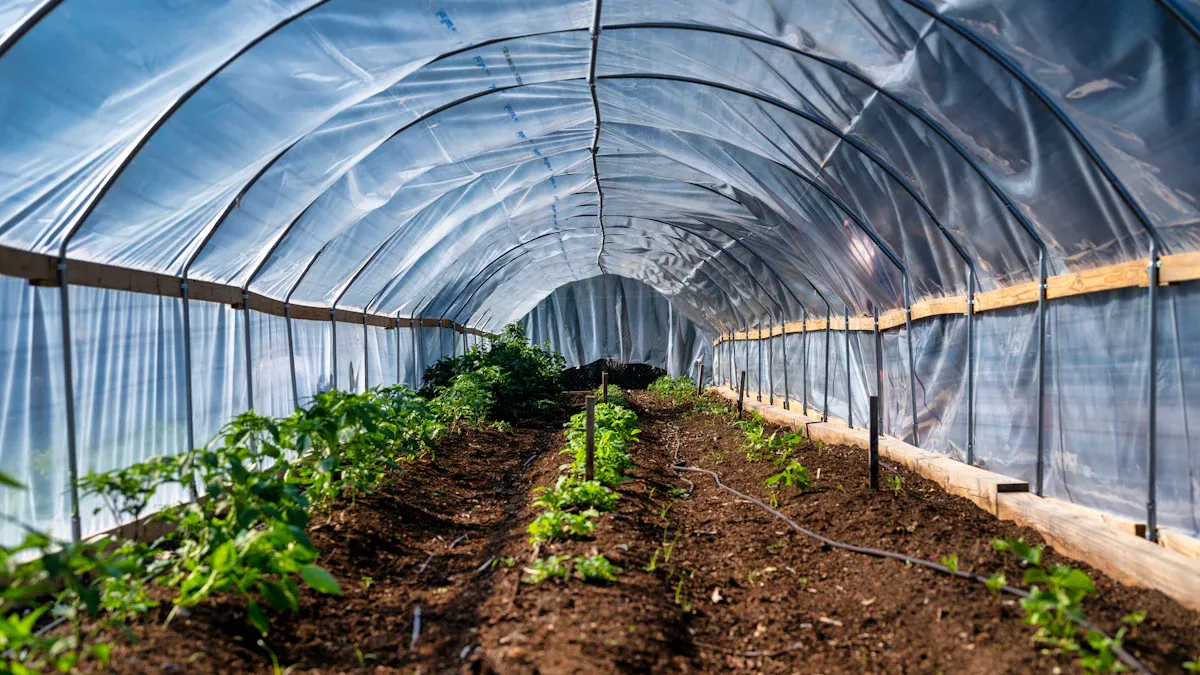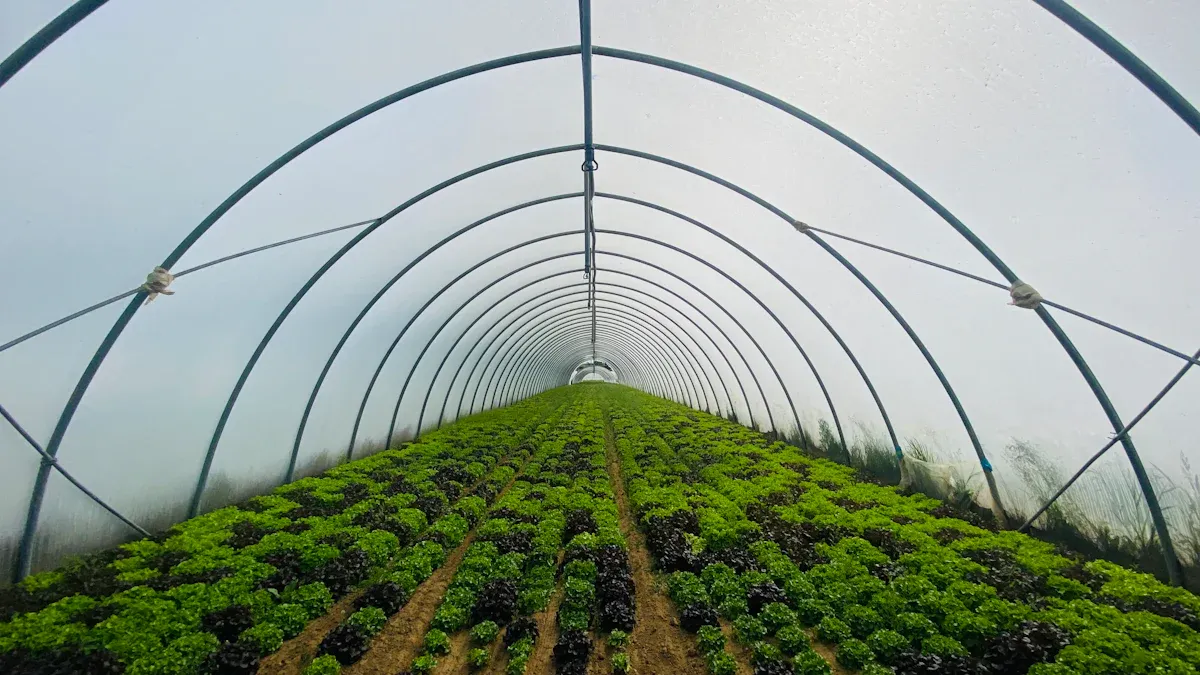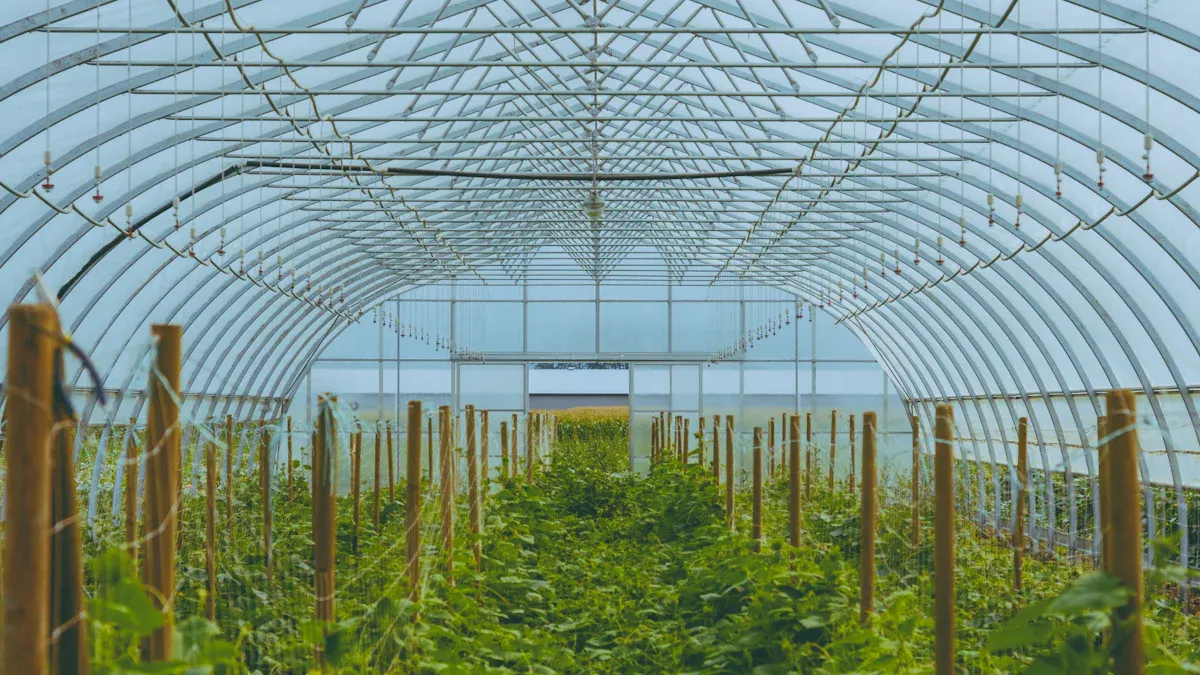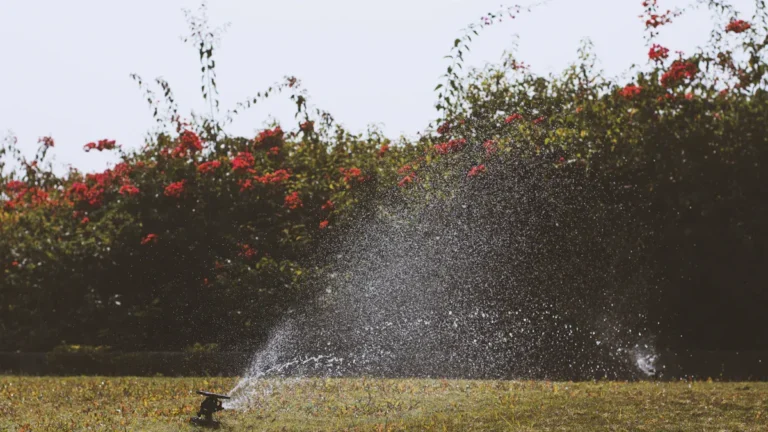Why Greenhouses Are Key to Organic Farming Success
Greenhouses with agricultural irrigation boost organic farming by enabling year-round growth, conserving water, and protecting crops from pests and weather extremes.

Greenhouses provide a controlled environment for growing organic plants, making them an essential tool for modern farming. By incorporating greenhouse Thủy lợi nông nghiệp systems, farmers can produce better crops while conserving water and reducing the need for pesticides. Greenhouses protect plants from harsh weather conditions and support eco-friendly agricultural practices. These innovations address critical challenges in farming today. For instance, the U.S. utilizes over 112 million square feet of greenhouses to cultivate vegetables, with greenhouse farms increasing by 19% between 2012 Và 2017. With the help of agricultural irrigation in greenhouses, year-round farming becomes possible, addressing issues like limited farmland and the rising demand for fresh organic produce.
Key Takeaways
Greenhouses help plants grow well by controlling light, heat, and moisture. This makes plants healthier and increases crop amounts.
They keep crops safe from bugs and bad weather. This means fewer chemicals are needed, which helps organic farming.
Greenhouses let farmers grow food all year. This helps meet the need for fresh organic food and boosts earnings.
Special watering systems in greenhouses save water and feed plants directly. This helps farming stay eco-friendly.
Greenhouses protect helpful insects and allow farmers to grow many kinds of crops, supporting nature’s balance.
Core Benefits of Greenhouses

Controlled Environments for Better Growth
Greenhouses help create the best conditions for plants to grow. You can adjust light, temperature, độ ẩm, and CO2 levels easily. More light helps plants make food faster through photosynthesis. Keeping the right temperature helps plants stay healthy and grow well. Controlling humidity lowers plant stress and keeps them strong. These conditions lead to more crops and better-quality food.
Environmental Factor | How It Helps Plants |
|---|---|
Light | Speeds up photosynthesis and growth |
Temperature | Keeps plants healthy and growing |
CO2 Concentration | Boosts how plants make food |
Humidity | Reduces stress and keeps plants strong |
Nutrients | Helps plants grow fully and properly |
Using greenhouse irrigation systems gives water and nutrients straight to roots. This saves water and helps plants grow better and faster.
Protection from Pests and Weather Extremes
Greenhouses protect plants from pests, diseases, and bad weather. In open fields, plants face many risks, but greenhouses keep them safe. Screens or nets stop pests from harming crops, so fewer pesticides are needed. This supports organic farming methods.
Bad weather like heavy rain, frost, or heatwaves can damage plants. Greenhouses keep conditions steady to avoid these problems. Ví dụ, fans can cool the greenhouse during heatwaves. In winter, greenhouses hold heat to protect crops. This keeps plants growing and reduces losses.
Extended Growing Seasons and Off-Season Crops
Greenhouses let farmers grow crops all year long. This is great for organic farmers who want to sell fresh food anytime. Longer growing seasons help meet the demand for organic produce and increase profits.
Farmers can also grow crops in seasons they normally wouldn’t. For instance, tomatoes and cucumbers can grow in winter. This adds variety to what farmers sell and helps them stand out. Greenhouse irrigation systems make it easy to give plants water and nutrients, even in off-seasons.
Study | Key Findings |
|---|---|
Organic farming and greenhouse gas emissions | MỘT 1% rise in organic farming can cut emissions by 0.049%. |
Organic farming keeps carbon out of the atmosphere | 0.37 gigatons of carbon are stored yearly worldwide. |
Greenhouse farming helps the planet and meets the need for organic food.
Greenhouses and Organic Farming Principles
Reduced Chemical Dependency
Greenhouses let farmers grow crops without using harmful chemicals. By controlling the environment, pests and diseases can be stopped naturally. Ví dụ, screens or nets block insects from damaging plants. This means fewer chemical pesticides are needed, which fits organic farming rules.
Farmers can also keep soil healthy inside greenhouses. Organic compost and fertilizers stay in the soil because the enclosed space prevents washing away. This leads to stronger plants and less pollution.
Tip: Using greenhouses with smart irrigation systems sends nutrients straight to roots. This saves water and supports farming without chemicals.
Enhancing Soil Health and Water Efficiency
Greenhouses protect soil from erosion and pollution. Unlike open fields, greenhouse farming keeps soil rich and healthy. Farmers can rotate crops better, which stops soil from losing nutrients and helps farming last longer.
Water use is also improved. Greenhouses allow drip irrigation systems to water roots directly. This cuts down on wasted water and gives plants exactly what they need. Greenhouse irrigation systems are great for saving water while growing more crops.
Benefit | How It Helps |
|---|---|
Soil Protection | Stops erosion and keeps soil clean |
Crop Rotation | Keeps nutrients balanced |
Bảo tồn nước | Saves water with precise irrigation |
By improving soil and water care, greenhouses help farmers grow crops sustainably and protect the environment.
Supporting Biodiversity and Ecological Balance
Greenhouses provide a safe place for plants and helpful creatures. Farmers can add natural predators like ladybugs to control pests without chemicals. This boosts biodiversity and keeps nature balanced.
Planting different crops in greenhouses also helps the ecosystem. Growing many types of plants lowers risks like soil damage and pest problems. Greenhouses make it easy to try companion planting, where certain plants help each other grow better.
Note: Supporting biodiversity in greenhouses improves plant health and helps the planet stay healthy.
Practical Applications for Organic Farmers

Growing Different Crops in Small Spaces
Greenhouses help farmers grow many crops in small areas. This is great for organic farmers wanting to offer more produce. Using vertical farming or stacked planting, you can grow more in less space. Crops like lettuce, Thảo dược, and strawberries grow well in these setups. This method increases your harvest and meets the need for fresh organic food.
Greenhouses also help manage soil and water better. With greenhouse irrigation systems, water and nutrients go straight to plant roots. This saves water and ensures each plant gets what it needs. By using space and resources wisely, you can grow more without harming the environment.
Growing Crops All Year for Local Buyers
Greenhouses let farmers grow crops no matter the season. This helps organic farmers supply fresh food to local markets all year. TRONG 2023, the greenhouse farming market was worth $32.5 billion. By 2032, it may grow to $56.8 billion. This shows people want more organic, local food. Growing crops year-round helps farmers meet this demand and gain loyal customers.
People like organic food because it’s healthy and eco-friendly. Greenhouses support this by using natural fertilizers and pest control. This makes your crops more attractive to health-focused buyers and supports organic farming values.
Expanding Sustainable Farming with Greenhouse Irrigation
Greenhouses are perfect for growing crops sustainably. Drip irrigation systems save water and grow more crops. These systems give plants just the right amount of water. Tools like sensors and monitors make watering even more precise. This improves soil health and reduces waste.
Greenhouse farming helps the planet and is cost-effective. It saves water, keeps soil healthy, and supports biodiversity. It also ensures stable harvests and lowers costs. Using greenhouse irrigation balances caring for the earth and making a profit. This helps your farm grow while protecting the environment.
Greenhouses are important for organic farming because they help crops grow better. They let farmers grow healthy food, farm longer, and protect nature. These structures keep pests away, save water, and keep soil strong.
Why Greenhouses Matter: They match organic farming goals, making farming greener and better for the earth. Greenhouses help plants grow more, protect nature, and make farming last.
Greenhouses are more than just buildings; they help farmers grow organic food and care for the planet at the same time.
Câu hỏi thường gặp
Why are greenhouses important for organic farming?
Greenhouses give plants a safe place to grow without chemicals. They keep pests and bad weather away, making organic farming easier. This helps grow healthier food and supports eco-friendly farming.
Why do greenhouses reduce water waste?
Greenhouses use drip irrigation to send water straight to roots. This stops water from being wasted through evaporation or runoff. You can grow more food while saving water, which helps the environment.
Why do greenhouses support year-round farming?
Greenhouses keep temperatures and light steady, so crops grow anytime. This lets farmers provide fresh organic food all year, even in winter.
Why do greenhouses improve crop quality?
Greenhouses let farmers control light, độ ẩm, and nutrients. These conditions help plants grow strong and healthy. The result is better crops that people want to buy.
Why do greenhouses align with biodiversity goals?
Greenhouses are safe for helpful bugs like ladybugs to live. Farmers can grow different crops, which keeps nature balanced. This reduces the need for chemicals and helps the planet stay healthy.




